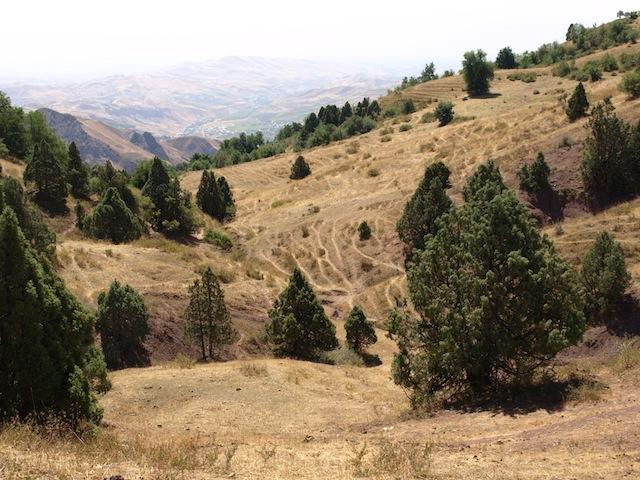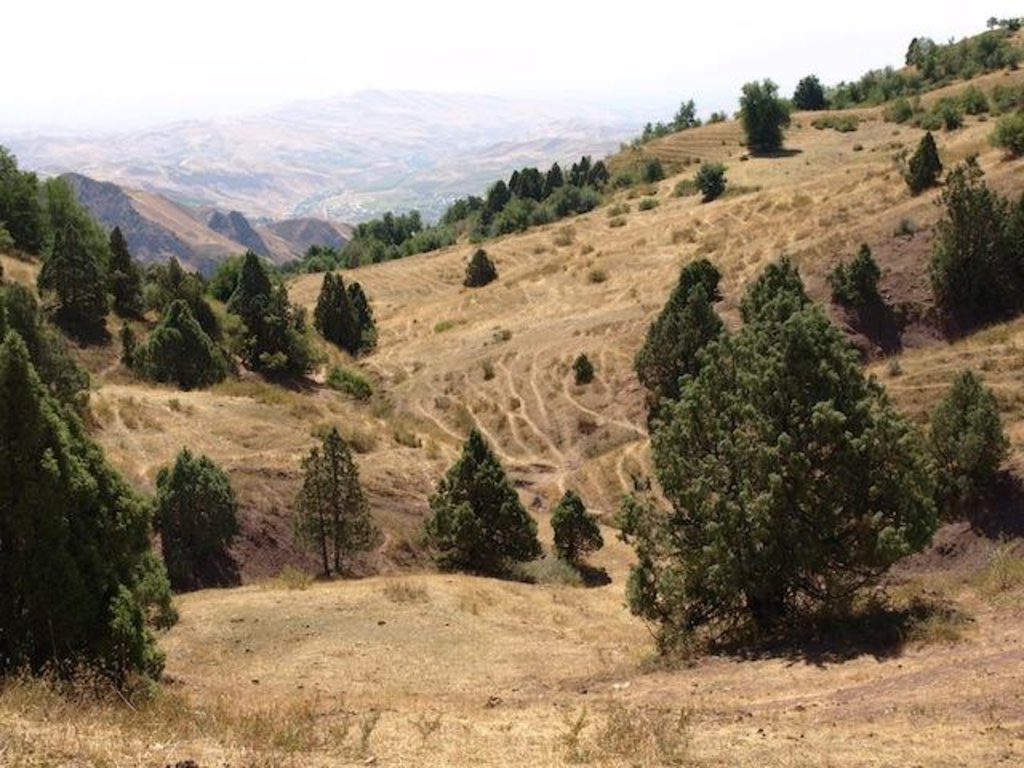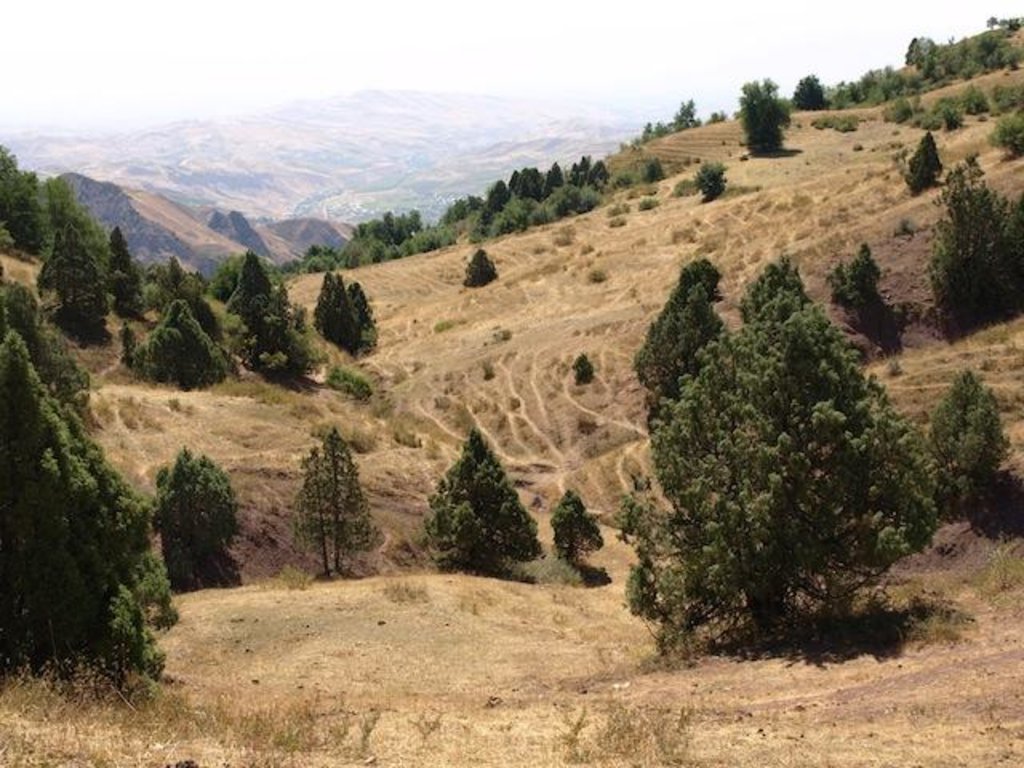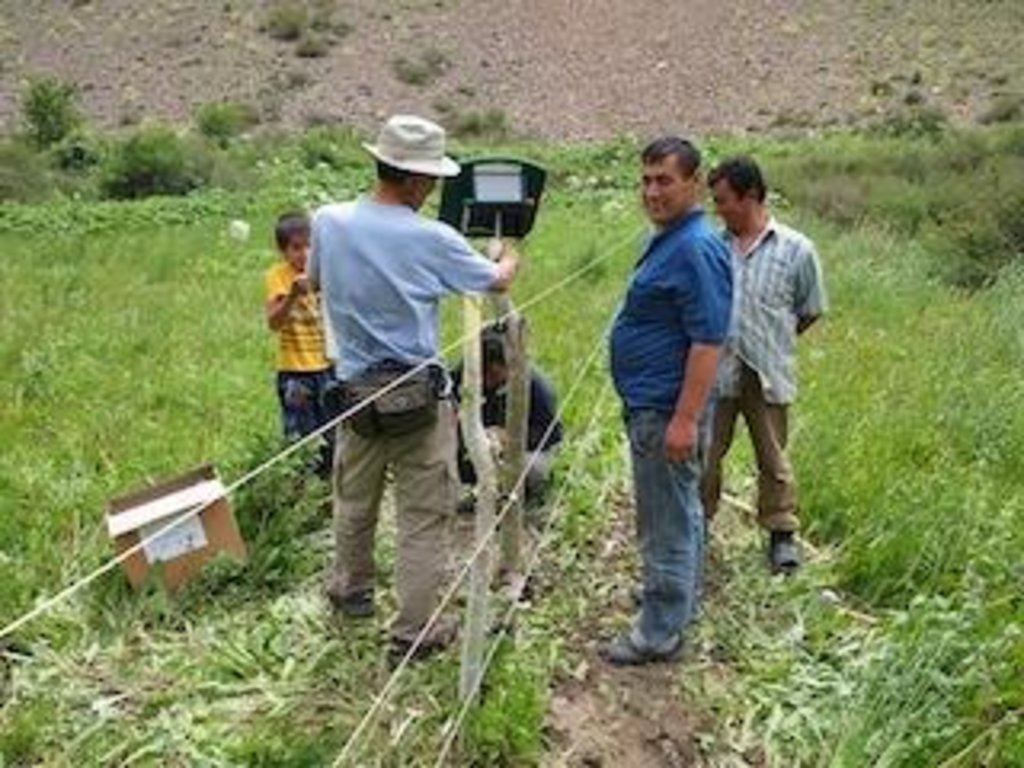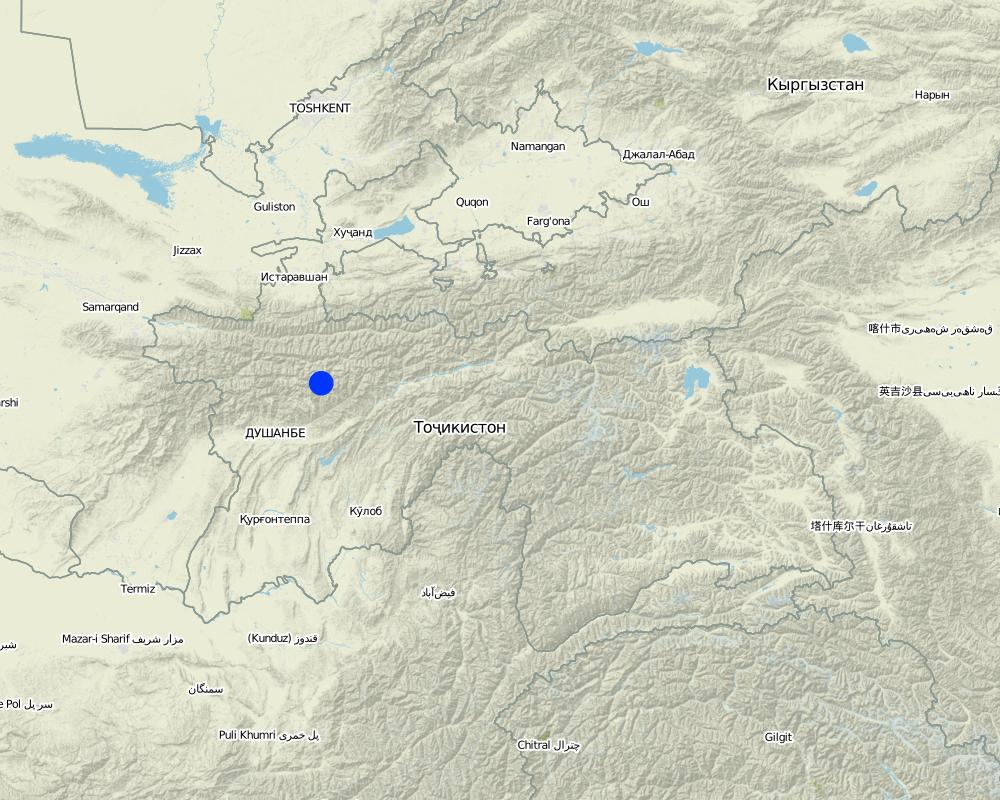Sustainable managements on pasture and forest lands based on natural regeneration by electrified fences [Tajiquistão]
- Criação:
- Atualização:
- Compilador/a: Kakubari Yochitaka
- Editor: –
- Revisor: David Streiff
approaches_2451 - Tajiquistão
Veja as seções
Expandir tudo Recolher tudo1. Informação geral
1.2 Detalhes do contato das pessoas capacitadas e instituições envolvidas na avaliação e documentação da abordagem
Especialista em GST:
Aidov Madibron
SFA
Federação Russa
Especialista em GST:
Kumalova Rina
FRI
Federação Russa
translator/assistant:
Shoh Sharipov
Federação Russa
Nome da(s) instituição(ões) que facilitou(ram) a documentação/avaliação da Abordagem (se relevante)
Shizuoka University - Japão1.3 Condições em relação ao uso da informação documentada através de WOCAT
Quando os dados foram compilados (no campo)?
11/06/2011
O/a compilador/a e a(s) pessoa(s) capacitada(s) aceitam as condições relativas ao uso de dados documentados através da WOCAT:
Sim
1.4 Referência ao(s) questionário(s) sobre tecnologias da GST
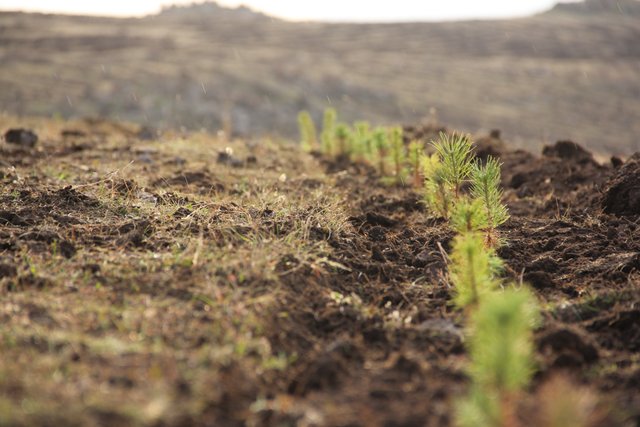
High-altitude afforestation for erosion control [Armênia]
Afforestation is a key technologies to protect soil against erosion and provide a wide range of ecosystem services. In this case, afforestation at high altitudes, which is particularly challenging, with the primary purpose of erosion control were planted in small patches with different methods. They form the basis for future …
- Compilador/a: Hanns Kirchmeir
2. Descrição da abordagem de GST
2.1 Descrição curta da abordagem
Sustainable managements on pasture and forest lands based on natural regeneration by electrified fences
2.2 Descrição detalhada da abordagem
Descrição detalhada da abordagem:
Aims / objectives: The aim is to avoid any animals grazing in the targeted areas by establishing electrified fences around the areas, conserving natural conditions of pasture and forestry lands, strengthening the communities’ incomes growth, and planting trees resilient to climate change, thereby contributing to maintaining soil of the areas healthy.
Methods: The project facilitated the following activities: Setting electrified fences that are generated by solar power, strengthening the regeneration of natural forest tree, planting fruiting trees for their sustainable incomes, planting trees such as juniper, pine, poplar, willow, among others. Planting Rosa canina in side of fence and R.C. grown up 2 meter height a few years later and functions as a natural fence. Electrified fence is moved to other site. Also, the project was heavily involved with farmer participation for the planning, fundraising, and implementation with farmers’ initiative.
Stages of implementation: 1. Awareness raising, 2. On the job training, 3. management activity planning, 4. Implementation, 5. Monitoring, 6. Readjustment based on results, 7. Further replication in new area.
Role of stakeholders: The Project had a leading role in initiation, orientation, awareness raising, mobilization, training, consultancy, input provision and mediation of communication. The local farmers have been actively participating, have provided labor input / financial contribution, provided indigenous knowledge and skills. Local authorities - providing land titles, participation in planning and decision making process. There are 5 households involved with in this project. The two Tajik communities (Duoba in Hisor and Kumarg in Ayni), each of which is consisting of 35 members. The members of all households took part in discussion rounds and training. Women: farmers came to the discussions together with their wives in certain level; the women took part in training, in implementing almost all of the adoption measures, and equally benefited from the project. However, they were not involved in decision making.
2.3 Fotos da abordagem
2.5 País/região/locais onde a abordagem foi aplicada
País:
Tajiquistão
Região/Estado/Província:
Tajikistan
Especificação adicional de localização:
Hisor/ Ayni
Map
×2.6 Datas de início e término da abordagem
Indique o ano de início:
2009
Ano de término (caso a abordagem não seja mais aplicada):
2012
Comentários:
We have performed to collect about various ecological disasters in Tajikistan since Sep.2009, and over 75 base line research sites are done by Japanese Society of Promotion for Science (JSPS). Japanese International Cooperation Agency (JICA) supported us. Research title is as follow; Reforestation and forestation in aim of reduction of generation of greenhouse gases and lessening of global warming
2.7 Tipo de abordagem
- Baseado em projeto/programa
2.8 Principais metas/objetivos da abordagem
The Approach focused mainly on SLM with other activities (natural regeneration, pasture management, protecting fruits trees, strengthening community incomes, resilient to climate change )
The aim is to avoid any animals grazing in the targeted areas by establishing electrified fences around the areas, conserving natural conditions of pasture and forestry lands, strengthening the communities’ incomes growth, and planting trees resilient to climate change, thereby contributing to maintaining soil of the areas healthy.
The SLM Approach addressed the following problems: Lack of land tenure rights implementation. Nominal state farm reorganization. Low agricultural production - lands depleted of nutrients, very low yields, no crop rotation, all of which have led heavy concentration on overgrazing by domestic cattle. Soil degradation particularly by heavy precipitation and gully formation. Lack of technical knowledge and awareness of soil & water conservation measures. Lack of cash to invest in development of land - just limited capacity to invest but need external financial input. Poverty - underlying cause of general lack of potential to invest in development.
2.9 Condição que propiciam ou inibem a implementação de tecnologia/tecnologias aplicada(s) segundo a abordagem
Disponibilidade/acesso a recursos e serviços financeiros
- Inibitivo
Lack of land tenure rights implementation. Nominal state farm reorganization. Low agricultural production - lands depleted of nutrients, very low yields, no crop rotation, all of which have led heavy concentration on overgrazing by domestic cattle. Soil d
Treatment through the SLM Approach: 1) The project was mainly supported by Japan Society for Promotion of Science and Japan International Cooperation Agency with some portion of Tajik government’s sources. However, the inputs (poles and wires) are almost fully available on the local market
Quadro institucional
- Inibitivo
1) The project was mainly supported by Japan Society for Promotion of Science and Japan International Cooperation Agency with some portion of Tajik government’s sources. However, the inputs (poles and wires) are almost fully available on the local market
Treatment through the SLM Approach: Knowledge and technologies are shared with S.F.A. in Dushanbe when necessary. By coordinating with S.F.A., the project obtained the right to use the land for planting. As well, local offices of State Forest Agency and local authorities and communities are
Quadro jurídico (posse de terra, direitos de uso da terra e da água)
- Propício
The existing land ownership, land use rights / water rights helped a little the approach implementation: I think it is very serious relationship between Land user ship and local citizens. and forest code is not coming enter on current datum. I think it is very important to be managed by new forest code.
- Inibitivo
Implementing the land tenure law and the privatization of state farms is still a difficult process with many inconsistencies for people claiming a land title in the area.
Treatment through the SLM Approach: AS shown above, by coordinating with State Forest Agency, the project was able to obtain land usage agreement on specific land plots.
3. Participação e papel das partes interessadas envolvidas
3.1 Partes interessadas envolvidas na abordagem e seus papéis
- Usuários de terra/comunidades locais
Men and women have both played an equal part in the orientation and planning sessions; men have played bigger role in the organization of activities, in the implementation of more manual work, whereas, women took part in the lighter work and in routine maintenance
- Especialistas em GST/ consultor agrícola
- Professores/alunos/estudantes
- Organização não governamental
- Setor privado
- Governo local
- Governo nacional (planejadores, responsáveis pelas decisões)
- Organização internacional
3.2 Envolvimento do usuários de terra/comunidades locais nas diferentes fases da abordagem
| Envolvimento do usuários de terra/comunidades locais | Especifique quem estava envolvido e descreva as atividades | |
|---|---|---|
| Iniciação/motivação | Apoio externo | farmers meeting with the team for orientation explaining goals, objectives. The communities who had strong understanding and willingness have only been selected. |
| Planejamento | Participativo | on site planning with farmers |
| Implementação | Participativo | training on the job, material inputs, and labor provision, cross visits |
| Monitoramento/avaliação | Participativo | Visits from the team at least once a month since the beginning, communications on ongoing activities, finding solutions. |
| Research | Automobilização | The team shares with the farmers the findings. |
3.3 Fluxograma (se disponível)
Descrição:
Organization of the sustainable Land management for pasture and forest lands is described in organization chart. It will be divided with three parts; career training, Basic research and afforestation.
Autor:
yoshitaka Kakubari (Univ. of Shizuoka, Japan)
3.4 Decisão sobre a seleção de tecnologia/tecnologias de GST
Especifique quem decidiu sobre a seleção de tecnologia/tecnologias a serem implementadas:
- Principalmente usuários da terra, apoiados por especialistas em GST
Explique:
mainly by sustainable land management specialists from Shizuoka University, State Forest Agency, and Forestry Research Institute, with consultation of land users.
Decisions on the method of implementing the SLM Technology were made by mainly by land users supported by SLM specialists. mainly by sustainable land management specialists from Shizuoka University, State Forest Agency, and National Academy of Science, with consultation of land users.
4. Suporte técnico, reforço das capacidades e gestão do conhecimento
4.1 Reforço das capacidades/ formação
Foi oferecida formação aos usuários da terra/outras partes interessadas?
Sim
Especifique quem foi capacitado:
- Usuários de terra
- Equipe de campo/consultores
Caso seja relevante, especifique gênero, idade, status, etnia, etc.
Training provided for local communities, local authorities, State Forest Agency
Tipo de formação:
- Em exercício
- Agricultor para agricultor
- Áreas de demonstração
- Reuniões públicas
- Cursos
Assuntos abordados:
Training focused on how to plant trees and how to manage them, how to set up the fences, how to use the fences,
4.2 Serviço de consultoria
Os usuários de terra têm acesso a um serviço de consultoria?
Sim
Especifique se foi oferecido serviço de consultoria:
- nas áreas dos usuários da terra
Descreva/comentários:
Name of method used for advisory service: Prof.Dr.Yoshitaka Kakubari;
Key elements: consultation on fencing concepts and choice for preventing from overgrazing, capacity building in strategy design, draft development plan for fence managements; 4. Land use management design considering soil depth, inclination and exposure. 5. Consultation on irrigation design, piping and making water channels 6. Consulting dry farming for good trapping of surface runoff and terrace planting method. 7. Treatment of tree saplings and transportation to the field. 8. Treatment of tree sapling on nursery, light and water regulation. 9. Grand treatment and cleaning, transportation of fertilization 10. Consultation on Planting, and judgment of leaf
Advisory service is totally inadequate to ensure the continuation of land conservation activities; The extension system is inadequate to ensure continuation of activities. The government branches need more development and organization to become able to manage land conservation activities; an independent advisory service is not in place, the only potential still exists within the DWHH Project
4.3 Fortalecimento da instituição (desenvolvimento organizacional)
As instituições foram fortalecidas ou estabelecidas através da abordagem?
- Sim, pouco
Especifique a que nível (níveis) as instituições foram fortalecidas ou estabelecidas:
- Local
- advising to make a land use managements
4.4 Monitoramento e avaliação
Monitoramento e avaliação são partes da abordagem?
Sim
Comentários:
bio-physical aspects were regular monitored by other through observations; indicators: Frequent visits and observations by the project team - tree planting, growing situation, regeneratio
bio-physical aspects were regular monitored by None through measurements; indicators: Ad hoc observations by the project team - labor availability, etc.
technical aspects were ad hoc monitored by None through observations; indicators: Regular measurements by the project team- fodder produced cent/ha, vegetables
socio-cultural aspects were regular monitored by None through observations; indicators: Ad hoc observations by land users and frequent visits by the project team
economic / production aspects were ad hoc monitored by None through measurements; indicators: Ad hoc observations by land users and frequent visits by the project team - technology adaptation ba
area treated aspects were None monitored by None through observations; indicators: None
management of Approach aspects were None monitored by None through observations; indicators: None
There were no changes in the Approach as a result of monitoring and evaluation: There were no changes in the approach. However, the trees planted by the local communities after technical advice and demonstration was not appropriately planned, therefore, after the monitoring and evaluation, they were re-planted. Also, the project team realized that it would be better to have plant relatively young trees as they adapt better in the targeted areas.
There were few changes in the Technology as a result of monitoring and evaluation: I'm able to confirm them after and after they can treat tools and planting materials before they have done. It was very roughly to treat root system of planting saplings, therefore material becomes very weak and easy to die.
4.5 Pesquisa
A pesquisa foi parte da abordagem?
Sim
Especifique os tópicos:
- Ecologia
Dê mais detalhes e indique quem realizou a pesquisa:
It focuses on observation of the trees and other plants in the fenced areas, especially regeneration of originally seeded plants. Tree growth rates and damages of grazing are recorded inside and outside of fencing area. For getting evidence by electric fences, we will try a small experiment. We shall confirm that electric fence protects plants from grazing of domestic animals.
Research was carried out both on station and on-farm
5. Financiamento e apoio material externo
5.1 Orçamento anual para o componente de GST da abordagem
Caso o orçamento exato seja desconhecido, indique a faixa:
- 10.000-100.000
Comentários (p. ex. principais fontes de recursos/principais doadores):
Approach costs were met by the following donors: international (Japanese Society Promotion of Sciences (JSPS) and JICA): 100.0%
5.2 Apoio financeiro/material concedido aos usuários da terra
Os usuários da terra receberam apoio financeiro/material para a implementação de tecnologia/tecnologias?
Não
5.3 Subsídios para entradas específicas (incluindo mão-de-obra)
- Equipamento
| Especifique quais entradas foram subsidiadas | Em que medida | Especifique os subsídios |
|---|---|---|
| Ferramentas | Totalmente financiado | Shovel, hoe, pipe, iron wire etc |
- Agrícola
| Especifique quais entradas foram subsidiadas | Em que medida | Especifique os subsídios |
|---|---|---|
| planting materials | Totalmente financiado | |
- Construção
| Especifique quais entradas foram subsidiadas | Em que medida | Especifique os subsídios |
|---|---|---|
| Madeira | Totalmente financiado | fences, wooden pole |
- Infraestrutura
| Especifique quais entradas foram subsidiadas | Em que medida | Especifique os subsídios |
|---|---|---|
| irrigation system | Totalmente financiado | |
- Outro
| Outros (especifique) | Em que medida | Especifique os subsídios |
|---|---|---|
| material transportation | Totalmente financiado |
Se a mão-de-obra pelos usuários da terra foi uma entrada substancial, isso foi:
- Pago em dinheiro
Comentários:
It is important to pay to land users and regional villagers.
Also labour is paid in food-for-work
5.4 Crédito
Foi concedido crédito segundo a abordagem para atividades de GST?
Não
6. Análise de impactos e declarações finais
6.1 Impactos da abordagem
A abordagem auxiliou os usuários da terra a implementar e manter as tecnologias de GST?
- Não
- Sim, pouco
- Sim, moderadamente
- Sim, significativamente
We have oft said to local villagers how to take a treatment and transportation of materials to pilot site, and how to make a water irrigation channels etc.
A abordagem concedeu autonomia aos grupos social e economicamente desfavorecidos?
- Não
- Sim, pouco
- Sim, moderadamente
- Sim, significativamente
Yes, it is still not obvious.
A abordagem melhorou as questões de posse de terra/diretos do usuário que inibiam a implementação das tecnologias de GST?
- Não
- Sim, pouco
- Sim, moderadamente
- Sim, significativamente
I have already described in above the paragraph about the reason.
Did other land users / projects adopt the Approach?
- Não
- Sim, pouco
- Sim, moderadamente
- Sim, significativamente
We make a two pilot sites, Duoba in Hisor and 2 sites Kumarg sites in Ayni districts for implementations to other citizens, and welcome to many guests from other district and sometimes taking many visitors from Governmental organizations.
Did the Approach lead to improved livelihoods / human well-being?
- Não
- Sim, pouco
- Sim, moderadamente
- Sim, significativamente
It is not still positive changes of local citizens but I believe changing positive in future.
Did the Approach help to alleviate poverty?
- Não
- Sim, pouco
- Sim, moderadamente
- Sim, significativamente
I have not still any evident for explanations.
6.2 Principal motivação dos usuários da terra para implementar a GST
- Produção aumentada
introducing to fruits trees at first , and after introducing forest trees
- Lucro (lucrabilidade) aumentado, melhora da relação custo-benefício
ntroducing to fruits trees at first , and after introducing forest trees
- Carga de trabalho reduzida
It is needful and important to attend of women
- Pagamentos/subsídios
to monitor money flows, and release information.
- normas e regulamentos (multas)/aplicação
It needs but it is difficult to introduce at first.
- Prestígio, pressão social/coesão social
it is important to manage together with local citizens
- Afiliação a movimento/projeto/grupo/rede
it will be getting serious situation by new group and network
- Consciência ambiental
- Melhoria estética
- well-being and livelihoods improvement
6.3 Atividades de sustentabilidade de abordagem
Os usuários da terra podem manter o que foi implementado através da abordagem (sem apoio externo)?
- Sim
Caso afirmativo, descreva como:
Finally it will be getting the sustainable land management condition in future without any support.
7. Referências e links
7.1 Métodos/fontes de informação
- visitas de campo, pesquisas de campo
- entrevistas com usuários de terras
7.2 Referências às publicações disponíveis
Título, autor, ano, ISBN:
JSPS Home Page 'Reforestation and forestation in aim of reduction of generation of greenhouse gases and lessening of global warming, Yoshitaka KAKUBARI, 2009
Disponível de onde? Custos?
JSPS, Japan
Links e módulos
Expandir tudo Recolher tudoLinks

High-altitude afforestation for erosion control [Armênia]
Afforestation is a key technologies to protect soil against erosion and provide a wide range of ecosystem services. In this case, afforestation at high altitudes, which is particularly challenging, with the primary purpose of erosion control were planted in small patches with different methods. They form the basis for future …
- Compilador/a: Hanns Kirchmeir
Módulos
Não há módulos


